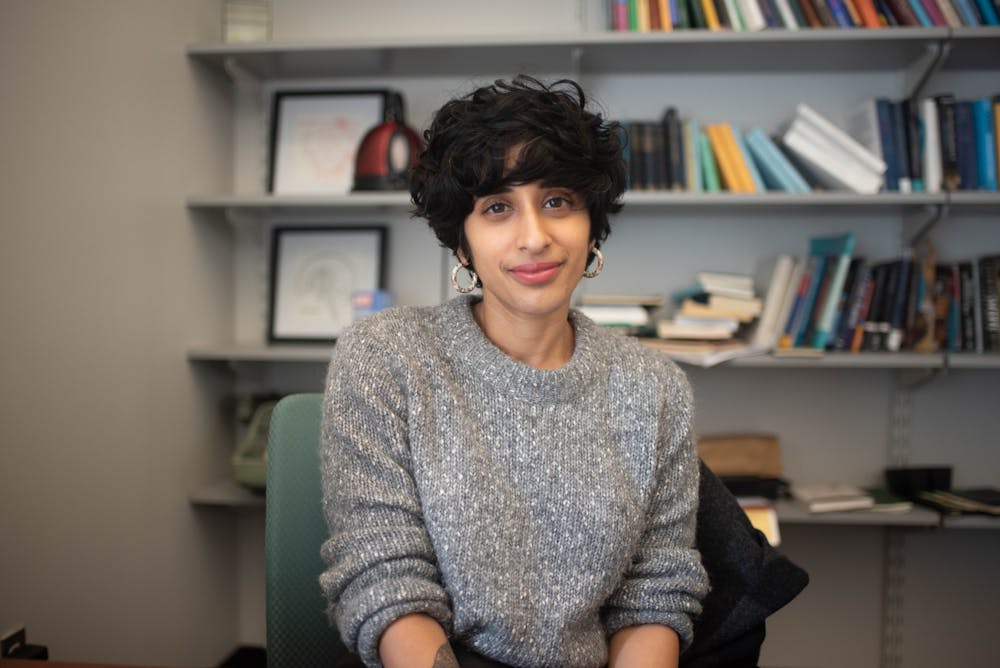Whether a student is interested in philosophy, simply wants to take an interesting elective, or, like many of us, is completely lost with their love and sex life—“PHIL–281: Philosophical Issues around Love and Sex” has a place for everyone.
Taught by Sukaina Hirji, PHIL–281 is a small course with around 25 students, offered every spring semester on even–numbered years. The aim is for students to learn philosophical skills while looking at topics surrounding love and sex, and eventually gain the tools to apply these philosophical principles to their personal lives. The class encourages students from different academic backgrounds to join, as there are no prerequisites to take the course.
Hirji is a recent addition to Penn’s Philosophy department, coming at the beginning of the Fall 2019 semester as an assistant professor with an extensive background in philosophy. She began her undergraduate education convinced that she would become a doctor, but soon realized that it was not the path for her.
“My parents really wanted me to be a medical doctor and I just had this kind of revelatory moment when I was in my undergraduate. I was taking an elective in, I think, comparative literature, and I just realized for the first time that you could take a course that would speak to your own life, and the things you care about, and you could enjoy learning. For me, that was a real sign that I was in the wrong field,” she reflects.
Hirji currently works in both ancient philosophy and contemporary ethics, with much of her research exploring “the Aristotelian idea that there is something intrinsically valuable about developing and exercising capacities that are central to our nature as human beings.”
Hirji mentions that philosophy is a subject that’s notoriously hard to define, because as a field it questions some of the foundations of other fields of study, and thus should not be defined in terms of its subject matter.
“I think the better way to understand philosophy is not in terms of its subject matter, but just in terms of the class of tools that we use,” she says.
Hirji says that love and sex perfectly fit into philosophical study, as any subject is open for philosophical exploration. The class looks at love and sex through different perspectives: metaphysics, which deals with the principles of things, epistemology, which is concerned with knowledge and belief, aesthetics, concerned with appreciation regarding art and beauty, and feminist philosophy.
“[Philosophy is] really defined by the kind of critical tools you use to investigate, and I think love and sex are just great topics for a philosophy course because you get to use the resources from a lot of different parts about philosophy,” Hirji says.
The first half of the course is concerned with love; some of the questions that students look into include what love is, the range of loving relationships individuals can have, whether one type of love is common across each individual relationship, and how love intersects with issues around race and gender. They also look at other particular topics—Hirji mentions that the class will be looking into unrequited love as a Valentine’s Day topic.
During the second half, the class will focus more on sex and related topics, such as the exploration of pornography and whether it is inherently misogynistic, an investigation into consent and sexual negotiation, and whether an individual has the right to expect sex from someone else.
Hirji laughs when asked to give a crash course on one of her favorite topics that will be taught in the course, “Oh wow, that’s really hard. I don’t even know how to begin answering!”
Unable to choose from the variety of interesting topics, she talks about a subject that the class has been exploring for the last couple of weeks: the question of why love is so specific.
“Whether when you love another person it’s a response to things you perceive that are valuable about them, or whether love is actually just not really a response to values or qualities in another person, but, instead, is just kind of something that you feel towards another person, and then because you feel love towards another person then that’s sort of what imbues the other person with a special sort of value for you,” she says.
“So the question there is, there’s this kind of challenge when we’re thinking about why we love another person. Why think that the love that we have for another person is kind of irreplaceable? Why is it so specific to the person we love? If you think love is just the response to the qualities of another person, then there’s this worry that if you found somebody else with the very same set of qualities, then you might feel the exact same love for that other person.”
Whether love is a response to the qualities in an individual or whether one perceives the individual to have value because of love is just one of the interesting topics covered in class.
Ultimately, what’s unique about the course is the potential for people to apply the subject matter to their personal, everyday lives, not simply their professional lives. Hirji hopes every student enjoys the course and that it can be tied to their personal experiences.
“I hope that through thinking about love and sex in this kind of rigorous, analytic way, they then have some resources to think about their own lives,” Hirji says.
In the future, she wants to continue teaching courses in which students feel engaged both philosophically and personally.
“I worry that sometimes philosophy can be so abstract and so analytic, that it’s hard for students to feel that it bears any relevance in their personal lives,” she says.

